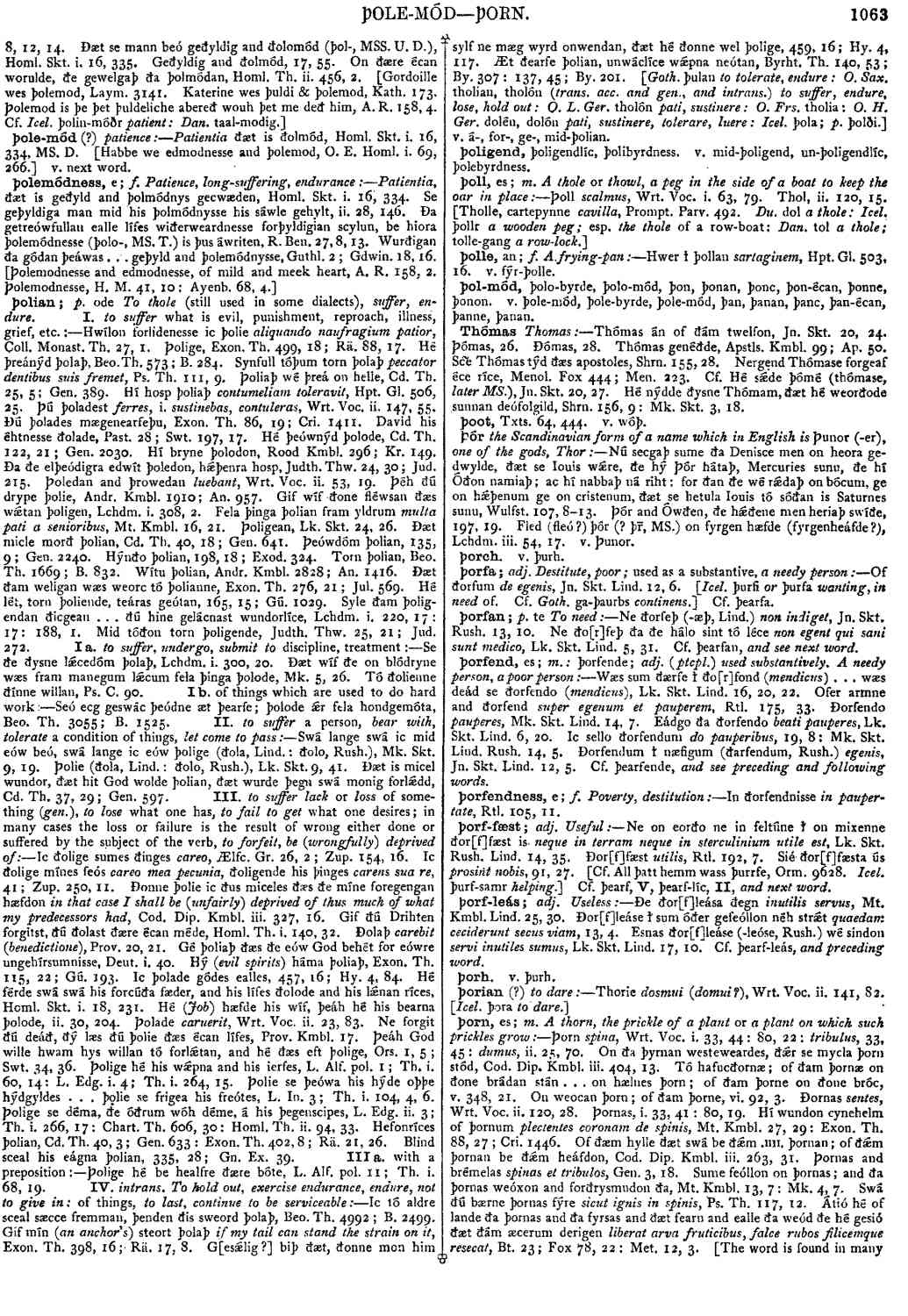þolian
- verb [ weak ]
-
Hwílon forlidenesse ic þolie
aliquando naufragium patior,
- Coll. Monast. Th. 27, 1.
-
Þolige,
- Exon. Th. 499, 18; Rä. 88, 17.
-
Hé þreánýd þolaþ,
- Beo.Th. 573; B. 284.
-
Synfull tóþum torn þolaþ
peccator dentibus suis fremet,
- Ps. Th. 111, 9.
-
Þoliaþ wé þreá on helle,
- Cd. Th. 25, 5; Gen. 389.
-
Hí hosp þoliaþ
contumeliam toleravit,
- Hpt. Gl. 506, 25.
-
Þú þoladest
ferres, i. sustinebas, contuleras,
- Wrt. Voc. ii. 147, 55.
-
Ðú þolades mægenearfeþu,
- Exon. Th. 86, 19; Cri. 1411.
-
David his éhtnesse ðolade,
- Past. 28; Swt. 197, 17.
-
Hé þeównýd þolode,
- Cd. Th. 122, 21; Gen. 2030.
- Hí bryne þolodon, Rood Kmbl. 296; Kr. 149.
-
Ða ðe elþeódigra edwít þoledon, hǽþenra hasp,
- Judth. Thw. 24, 30; Jud. 215.
-
Þoledan and þrowedan
luebant,
- Wrt. Voc. ii. 53, 19.
-
Þéh ðú drype þolie,
- Andr. Kmbl. 1910; An. 957.
-
Gif wíf ðone fléwsan ðæs wǽtan þoligen,
- Lchdm. i. 308, 2.
-
Fela þinga þolian fram yldrum
multa pati a senioribus,
- Mt. Kmbl. 16, 21.
-
Þoligean,
- Lk. Skt. 24, 26.
-
Ðæt micle morð þolian,
- Cd. Th. 40, 18; Gen. 641.
-
Þeówdóm þolian,
- 135, 9; Gen. 2240.
-
Hýnðo þolian,
- 198, 18; Exod. 324.
-
Torn þolian,
- Beo. Th. 1669; B. 832.
-
Wítu þolian,
- Andr. Kmbl. 2828; An. 1416.
-
Ðæt ðam weligan wæs weorc tó þolianne,
- Exon. Th. 276, 21; Jul. 569.
-
Hé lét, torn þoliende, teáras geótan,
- 165, 15; Gú. 1029.
-
Syle ðam þoligendan ðicgean ... ðú hine gelácnast wundorlíce,
- Lchdm. i. 220, 17: 17: 188, 1.
-
Mid tóðon torn þoligende, Judth. Thw. 25, 21; Jud. 272. I a.
to suffer, undergo, submit to
discipline, treatment :-- Se ðe ðysne lǽcedóm þolaþ,- Lchdm. i. 300,
20.
-
Ðæt wíf ðe on blódryne wæs fram manegum lǽcum fela þinga þolode,
- Mk. 5, 26.
-
Tó ðolienne ðínne willan,
- Ps. C. 90. I b. of
-
Swá lange swá ic mid eów beó, swá lange ic eów þolige (ðola,
- Lind.: ðolo, Rush.), Mk. Skt. 9, 19.
-
Þolie (ðola,
- Lind.: ðolo, Rush.), Lk. Skt. 9, 41.
-
Ðæt is micel wundor, ðæt hit God wolde þolian, ðæt wurde þegn swá monig forlǽdd,
- Cd. Th. 37, 29; Gen. 597.
-
Ic ðolige sumes ðinges
careo,
- Ælfc. Gr. 26, 2; Zup. 154, 16.
-
Ic ðolige mínes feós careo mea pecunia, ðoligende his þinges
carens sua re,
- 41; Zup. 250, 11.
-
Ðonne þolie ic ðus miceles ðæs ðe míne foregengan hæfdon
in that case I shall be (unfairly) deprived of thus much of what my predecessors had,
- Cod. Dip. Kmbl. iii. 327, 16.
-
Gif ðú Drihten forgitst, ðú ðolast ðære écan méde,
- Homl. Th. i. 140, 32.
-
Ðolaþ
carebit (benedictione ),
- Prov. 20, 21.
-
Gé þoliaþ ðæs ðe eów God behét for eówre ungehírsumnisse,
- Deut. i. 40.
-
Hý (
evil spirits
) háma þoliaþ,- Exon.
Th. 115, 22; Gú. 193.
-
Ic þolade gódes ealles,
- 457, 16; Hy. 4, 84.
-
Hé férde swá swá his forcúða fæder, and his lífes ðolode and his lǽnan ríces,
- Homl. Skt. i. 18, 231.
-
Hé (
Job
) hæfde his wíf, þeáh hé his bearna þolode, ii.- 30, 204.
-
Þolade
caruerit,
- Wrt. Voc. ii. 23, 83.
-
Ne forgit ðú deáð, ðý læs ðú þolie ðæs écan lífes,
- Prov. Kmbl. 17.
-
Þeáh God wille hwam hys willan tó forlǽtan, and hé ðæs eft þolige,
- Ors. 1, 5; Swt. 34, 36.
-
Þolige hé his wǽpna and his ierfes,
- L. Alf. pol. 1; Th. i. 60, 14: L. Edg. i. 4; Th. i. 264,
15.
-
Þolie se þeówa his hýde oþþe hýdgyldes ... þolie se frigea his freótes,
- L. In. 3; Th. i. 104, 4, 6.
-
Þolige se déma, ðe óðrum wóh déme, á his þegenscipes,
- L. Edg. ii. 3; Th. i. 266, 17: Chart. Th. 606, 30: Homl. Th. ii. 94,
33.
-
Hefonríces þolian,
- Cd. Th. 40, 3; Gen. 633: Exon. Th. 402, 8; Rä. 21, 26.
-
Blind sceal his eágna þolian,
- 335, 28; Gn. Ex. 39.
- III a. with a preposition :---
-
Ic tó aldre sceal sæcce fremmau, þenden ðis sweord þolaþ,
- Beo. Th. 4992; B. 2499.
-
Gif mín (an anchor's) steort þolaþ
if my tail can stand the strain on it,
- Exon. Th. 398, 16; Rä. 17, 8.
-
G[esǽlig?] biþ ðæt, ðonne mon him sylf ne mæg wyrd onwendan, ðæt hé ðonne wel þolige,
- 459, 16; Hy. 4, 117.
-
Æt ðearfe þolian, unwáclíce wǽpna neótan,
- Byrht. Th. 140, 53; By. 307: 137, 45; By. 201.
Bosworth, Joseph. “þolian.” In An Anglo-Saxon Dictionary Online, edited by Thomas Northcote Toller, Christ Sean, and Ondřej Tichy. Prague: Faculty of Arts, Charles University, 2014. https://bosworthtoller.com/31925.
Checked: 0